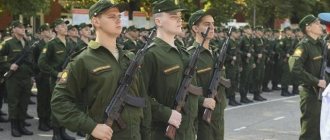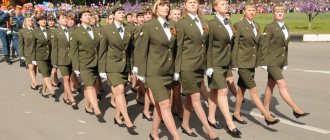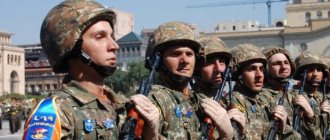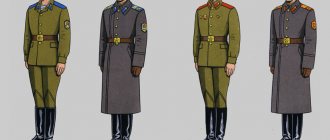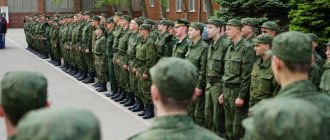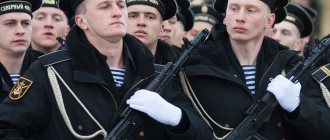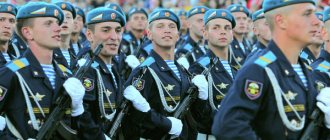Recruitment campaign
According to the legislation of the Russian Federation, the conscription campaign takes place twice a year: in the spring - from April to mid-July, in the fall - from October to the end of December. All young men in the age category from 18 to 27 years old who have no contraindications to service for health reasons are subject to conscription.
During the conscription campaign, every young person aged 18 to 27 who is subject to conscription receives a summons for which he must sign. The summons must be delivered personally to the conscript; its transmission through neighbors, friends and other strangers is prohibited.
Military conscription service, its features
Male citizens aged 18 to 27 years, who are (are required to be registered with the military), are not in the reserve and do not have the right to exemption from military service, are subject to conscription for military service. The conscription of citizens for military service is carried out on the basis of decrees of the President of the Russian Federation and is carried out 2 times a year (from April 1 to June 30 and from October 1 to December 31) for a period of 24, 18 or 12 months.
To carry out the draft, a draft commission is created. A citizen subject to conscription for military service undergoes a medical examination. Based on the results of the examination, as well as taking into account other data, the draft commission makes one of the following decisions:
1) call for military service;
2) send to alternative service;
3) provide a deferment from conscription for military service;
4) exempt from military duty.
Those recognized as fit for military service (or fit with minor restrictions) are subject to conscription for military service. As a rule, citizens who have a category of fitness for military service with minor restrictions are not sent to the Air Force, Marine Corps, amphibious personnel of the Navy and some other units.
Citizens declared temporarily unfit for military service are granted a deferment from conscription for examination and treatment for a period of 6 or 12 months.
Those recognized as being of limited fitness are enlisted in the reserves, and once every 3 years they are subject to a medical examination until they reach the age of 27. Those declared unfit for military service are removed from the military register.
The beginning of military service for citizens who are not in the reserve and called up for service is considered the day of departure from the military commissariat to the place of service. When enrolled in the unit's lists, they are assigned the military rank of "private" or "sailor" (except for those who have an officer rank).
The promotion of soldiers, sailors, sergeants and foremen is carried out depending on the availability of vacant positions and the suitability of candidates for these positions. The ranks of “corporal” and “senior sailor” are assigned to privates or sailors who perform their duties in an exemplary manner, have good and excellent academic results and exemplary military discipline, as well as when appointed to positions for which these military ranks are provided. The first sergeant and senior ranks are awarded to military personnel who have successfully completed training units or passed tests according to established programs. Subsequent sergeant and senior ranks are awarded in accordance with the position held and as an incentive.
The end of military service is considered the day on which the period of military service expires. This is true, but only theoretically. Many military personnel think so - every day. In fact, it is impossible to fire everyone on one day, both organizationally and from the point of view of ensuring combat readiness. It’s not for nothing that each call - spring and autumn - lasts 3 months. It is during this time that personnel are replaced. Those who have served their time are sent home in small groups, and new arrivals take their places. All those who were called up in the spring must be dismissed by June 30, and those who were drafted in the fall by December 31. Unit commanders who are directly responsible for this process evaluate the training of young soldiers and can detain more trained soldiers for 1-2 months so that they can help the young ones quickly master military equipment.
It won’t hurt pre-conscripts to know this. There are commanders who can be understood as a human being. Undisciplined, drinking, corrupting conscripts arrive, whose task is to serve their sentence. Educational measures often do not work on such people. Commanders have the right to dismiss them on the last day. They often use this right. And instead of arriving home already on May 1, such a soldier comes to his parents only after June 30, and 2 extra months is a long time! So it is better to serve well than poorly.
One of the most annoying mistakes that those transferred to the reserve make is the following. When driving home, they, considering themselves civilians, violate their dress code, drink alcoholic beverages, and sometimes come into conflict with vehicle passengers. As a result, they find themselves in a garrison guardhouse and cannot understand the reasons for the arrest. They already consider themselves civilians. But that's not true. By law, a military personnel discharged into the reserve becomes a civilian when he arrives at his military registration and enlistment office and registers with the military. Until this moment, he continues to serve, unless June 30 or December 31 has arrived.
I want to dispel another stereotype that has taken root among the people for the younger generation. Even in the media, illiterate journalists call the process of transferring to the reserve demobilization. All you see everywhere is DMB, DMB. It is not right. The last demobilization in the USSR was in 1946, when the last people mobilized for the war were dismissed. And this is how the usual conscription into military service and transfer to the reserve occurs. There is no mobilization yet, and God grant that there won’t be any for as long as possible!
Passing a medical examination at the military registration and enlistment office
Conscripted military service for a young man begins only after successfully passing a military medical commission and receiving a draft fitness category. Based on the results of the medical examination, the conscript is assigned one of the following categories:
- "A". The conscript has ideal health indicators;
- "B". The young man has minor health problems and is fit with some limitations;
- "IN". This category exempts you from military service, but you can be called up for military training and mobilized in case of war;
- "G". The conscript is given a temporary deferment for the implementation of medical measures;
- "D". The young man was declared completely unfit for military service and there was no need for re-examination.
When the service begins with a disbat
Instead of chevrons indicating military branches - number 3
The police squad that arrived on call took the rowdy soldier to the internal affairs department, where his status was quickly sorted out and he was transferred to the garrison guardhouse. I will not dwell on the details of the investigation of the criminal case, but the ending was as follows: Sergei Korzhenevsky was convicted by the military tribunal of the Tyumen garrison under paragraph “a” of Article 242 of the Criminal Code of the RSFSR “Violent actions against a superior.”
I remember that trial well, as I supported the prosecution as a state prosecutor. The defense of the defendant was carried out by an experienced lawyer Lyudmila Romanovna Komarova, who stated at the court hearing that her client did not have time to put on a military uniform, take a military oath and study the requirements of the military regulations of the Armed Forces of the USSR, so he had to be tried in a people's court.
These arguments had no effect on the military judge and two lay judges, so he was given a criminal sentence of imprisonment for a period of 2 years and 6 months. In accordance with Article 34 of the Criminal Code of the RSFSR, he was sent to serve his sentence in a disciplinary battalion. And for this guy, military service began with a disbat, about which my article with the same title was published in the regional newspaper.
At the place of serving his sentence in a disciplinary military unit, Sergei had to take the military oath, study the regulations and experience military service in more severe conditions behind barbed wire, with increased requirements and additional restrictions.
I dare to suggest that this was one of the few cases in a huge state called the USSR, and maybe even the only one in judicial practice. Nothing is known about the further fate of Sergei Korzhenevsky, except that he should now be 48 years old. And with Lyudmila Romanovna, at the end of her lawyering career, we remembered this case, and she was upset by this outcome of the criminal case. She still feels sorry for the “boy.”
Collection point
Service for a young man in the army upon conscription starts from a collection point, where young men appear on the appointed day and time after successfully passing a medical examination.
Upon arrival at the assembly point, conscripts are located in specially equipped rooms. There is everything you need: a shower, a toilet, good living conditions and a small retail outlet where you can buy something for yourself.
During his stay at the assembly point, the conscript goes through a number of events, including:
- Medical examination;
- Conducting lectures on the subject of the discipline;
- Registration of all conscript data in the registration card (including fingerprints);
- Issue of clothing, which includes a travel bag, mug, spoon and duffel bag;
- Receiving a metal token and a bank card.
In addition to all planned events, the conscript undergoes an interview with representatives of different military units, after which the recruits are assigned to one or another military unit.
The young man’s stay at the assembly point can last from several hours to several days, until the required number of soldiers is recruited.
Young Fighter Course (KMB)
Direct military service in the army upon conscription for soldiers begins with the completion of a young fighter course. The course includes activities to adapt to life in the army. The duration of the CMB is from 1.5 to 2 months and at the end of it the soldier takes the oath.
During the course of a young fighter, a soldier studies drill training, increases physical endurance, studies weapons and the principles of their operation, learns military regulations and other legal documents. Special emphasis is placed on maintaining strict discipline, following daily routines, and learning military duties.
General concepts
Security of the Russian Federation War as one of the forms of realization of a security threat Combat actions of the Armed Forces of the Russian Federation as the main element of the defense of the Russian Federation Military security of the Russian Federation Activities of the Russian special services to ensure the security of the Russian Federation Other types of activities to ensure the security of the Russian Federation Powers of the highest state authorities in matters of security defense and security of the Russian Federation Functions of enterprises, institutions, organizations and officials, as well as the rights and responsibilities of individual citizens in ensuring the defense and security of the Russian Federation Military duty Military
service
The difference between a military person and a civilian
In accordance with Art. 59 of the Constitution of the Russian Federation, defense of the Fatherland is a duty and responsibility
citizen of the Russian Federation. Every citizen of our country who does not have an appropriate exemption is obliged to enroll in military service for a certain period of time. Thus, as popular wisdom says, “Soldiers are not born, they are made.”
When entering military service, a citizen renounces (voluntarily or by virtue of fulfilling a constitutional duty) a number of his rights and freedoms defined by the Constitution of the Russian Federation. So, for example, a serviceman undergoing military service on conscription, in most cases, cannot choose his place of service, military specialty, commanders, and is limited in movement in his free time.
The loss of a number of rights and freedoms by a citizen who has entered military service is compensated by the state by granting him the status of a military serviceman, which provides a number of benefits.
What is included in the concept of “military service”?
In accordance with the military obligation provided for by the Constitution of the Russian Federation, Russian citizens must undergo military service.
Military service is a special type of public service of citizens in the Armed Forces of the Russian Federation, other troops and federal bodies (will be discussed in more detail in the chapter “Troops (forces) and federal bodies (special services), where those liable for military service will have to serve in the event of conscription or enlistment in military service under contract”, as well as in the volume of the Home Legal Encyclopedia “Military Service”).
Active military service consists of the fulfillment by citizens of the military obligation established by law (the Constitution of the Russian Federation, the Laws of the Russian Federation “On Defense”, “On Military Duty and Military Service”, etc.) to serve for certain periods in the ranks of the Armed Forces of the Russian Federation, other troops, foreign intelligence agencies, federal state security agencies and other government agencies where military service is provided for by law.
Based on the special nature of military service, its priority is determined over other types of public service and other activities of Russian citizens.
A citizen undergoing military service is a military serviceman and has a legal status determined by law. He is entrusted with responsibilities for the armed defense of the state, ensuring the security of the state, society and the individual. These responsibilities are associated with the need to unquestioningly carry out assigned tasks in any conditions, including at risk to life.
Military personnel perform military service in military units, on ships, enterprises, institutions, organizations, military educational institutions of vocational education (hereinafter referred to as military units).
The content and procedure for military service in peacetime are determined by the Law of the Russian Federation “On Military Duty and Military Service”, the Regulations on the Procedure for Military Service and military regulations.
The specifics of military service in other troops and bodies are determined by the laws regulating their activities.
The specifics of military service during mobilization and in wartime are determined by the laws of the Russian Federation.
How are the Armed Forces of the Russian Federation, other troops and federal bodies staffed?
The Armed Forces of the Russian Federation, other troops and federal bodies are recruited by military personnel by conscripting citizens of the Russian Federation for military service on an extraterritorial basis, as well as by voluntarily enlisting citizens of the Russian Federation for military service.
In addition, the Armed Forces of the Russian Federation, other troops and federal bodies are staffed with civilian personnel through voluntary recruitment. The number of civilian personnel is established by the Government of the Russian Federation, and the list of military positions filled by civilian personnel is established by the Minister of Defense of the Russian Federation, the heads of other troops and federal bodies.
For the mobilization deployment of the Armed Forces of the Russian Federation, other troops and federal bodies, a reserve of military-trained human resources is created, i.e., registered military citizens of the Russian Federation who have completed active military service or have been released from it for various reasons, but are fit for service in wartime ( For more details, see the chapter “Military registration”, “Preparing citizens for military service”, “Conscription for military service”, “Enrollment in military service under a contract” and “Admission to study in cadet corps and military schools”).
Reference.
The extraterritorial principle
of recruitment is the procedure for replenishing troops (forces) with personnel through the conscription of citizens living outside the areas of deployment (formation) of military units and formations.
To the personnel
include all military personnel and civilians employed in a specific military unit, formation, association, institution and other military organization.
Active duty uniforms
Military service includes the following forms:
- urgent compulsory conscription service for soldiers, sailors, sergeants, foremen and officers (called up from the reserve);
— contract service (including females) of soldiers, sailors, sergeants, foremen, warrant officers and midshipmen;
— contract service for cadets (students) of military educational institutions of vocational education;
— contract service for officers.
Reference.
Soldier
(from ig. soldo - coin, salary) - 1) primary (junior) military rank; 2) category of military personnel and those liable for military service in the soldier ranks of private, corporal, etc.
Sailor
(from the French mat - workmate, partner and lot - lot, fate) - the primary (junior) military rank in the Navy, corresponding to the rank of private (soldier) in other branches of the Armed Forces of the Russian Federation.
Sergeant
(from Latin serviens - employee) - a military rank of junior commanders of the Ground Forces, Air Force and Navy (with the exception of sailing personnel).
Sergeant Major -
1) the military rank of non-commissioned officer, awarded to the best senior sergeants of the Ground Forces, Air Force and Navy (with the exception of naval personnel); 2) in the naval personnel of the Navy - the military rank of junior commander; 3) an official in a company (battery), is the direct superior of soldiers and sergeants.
Ensign
(from Staroslav. prapor - banner, banner) - 1) military rank; 2) the category of junior commanders, who are the closest assistants to the officers.
Midshipman
(from English, midshipman - letters, middle ship rank) - 1) military rank; 2) the category of military personnel in the Navy who are junior commanders and closest assistants to officers.
Officer
(from Latin officium - position) - 1) a person in command (commanding) staff; 2) a full-time position at headquarters and other institutions of the Armed Forces of the Russian Federation (for example, senior officer of a department).
Oath
The soldier prepares for the oath with all responsibility. Three days before the significant event, intensive drill training begins, putting uniforms in order and studying the words of the oath.
During the solemn event, personnel are lined up on the parade ground, and the soldiers taking the oath occupy the first ranks of the formation. The event begins with the ceremonial removal of the Military Banner of the military unit, after which all the young men take turns reading the text of the oath.
After the ceremony, the soldier will have a festive table and his first discharge so that he can spend some time with his family.
Everyday life of the army
Military conscription service and its features attract many young people who take this test that befalls them with great pleasure. Every day, soldiers live according to the same schedule, which is approved by the unit commander. The only exceptions may be holidays and weekends.
The task of each soldier is:
- Comply with the requirements of the Charter;
- Master the skills of operating military equipment;
- Unquestioningly carry out the orders and instructions of commanders, even if they sometimes seem completely absurd;
- Wear uniform, have a neat appearance and observe the rules of personal hygiene;
- Be persistent in various situations;
- Keep and not disclose classified information even after demobilization;
- Show yourself only from a worthy side.
Dismissal of a soldier to the reserve
After 12 months of service, the soldier is transferred to the reserve, that is, transferred from the status of a military personnel to the military reserve.
After the Minister of Defense signs the order for the dismissal of soldiers of the next conscription, the preparation of all necessary documents for the demobilization of each serviceman begins. A soldier's term of service in the army ends when his name is deleted from the unit's lists. After this, he receives a military ID, personal belongings and other documents, and returns to life as a civilian.
Thus, military service upon conscription is an obligation that every young man who has no contraindications due to health or other reasons must fulfill. The path of military service may seem long and not always easy to some, but during this time the young man learns to be independent, physically resilient and courageous. All stages of military service are very important and help to acquire new knowledge and skills, so they must be completed with pride. Service in the Armed Forces of the Russian Federation will certainly help a young man find the right path in life and achieve significant success.
Soldier or conscript in the USSR
I remembered one case from my own investigative practice thirty years ago, which is of certain interest to lawyers. When the time came for Sergei Korzhenevsky, like others of his age, to fulfill his military duty, he was called up for military service.
Having received a military ID from the hands of the district military commissar and crossed the threshold of the military registration and enlistment office to be sent to the unit, he automatically became a military man. Why did I use the word “automatically”, because no one promoted him to military service by special order or gave him such status.
At that time, the Regulations on the performance of active military service by soldiers, sailors, sergeants and foremen of the Soviet Army and Navy were in force, put into effect by order of the Minister of Defense of the USSR in 1984 No. 150. According to paragraph 5 of the regulation: “The beginning of the state on active military service military service is considered the day a conscript appears at the military commissariat to be sent to a military unit, institution, military educational institution, enterprise or organization of the Ministry of Defense.”
Please note that this is not an order on enrollment in military service, not an order on conferring the military rank of “private” or on enrollment in the lists of unit personnel, but the day the conscript appears at the military commissariat to be sent to a military unit.
At the regional recruiting station, visits with relatives and friends were allowed. Sergei’s friends decided to have a drink with him “on the road”, not taking into account that for him drinking alcohol was already a disciplinary offense, and not just drinking alcohol in a public place.
When the newly minted soldier's drinking buddies took their leave, Sergei was devastated due to the lack of a good snack and physical and emotional stress. For this reason, he was not able to adequately assess the situation, so he hit two officers, his temporary commanders, in the face.


